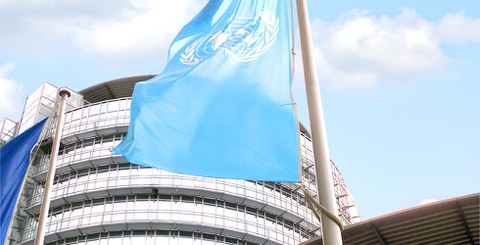Sep 17, 2024
The German Government and the Free State of Saxony confirm the basic funding for UNU-FLORES in Dresden totaling EUR 8.4 million over the next few years

UNU-FLORES building in Dresden.
The Federal Ministry of Education and Research (BMBF), the Saxon State Ministry of Science, Culture and Tourism (SMWK) and TUD Dresden University of Technology (TU Dresden) have signed a new agreement to secure continued basic funding for UNU-FLORES (United Nations University Institute for Integrated Management of Material Fluxes and of Resources).
Dresden is the only location of a United Nations University Institute in Germany bar Bonn. The institute's research focuses on environmental resources and the question of how climate, land use and population structure affect them. There are a lot of changes in these areas, which makes long-term and sustainable solutions increasingly important. This is a key objective of the research.
It has been agreed that the BMBF will provide EUR 1.051 million per year from the BMBF budget for a period of four years, starting January 1, 2025. During the funding period, the Free State of Saxony will match the amount of annual funding. This means that financing for UNU-FLORES will remain at the same high level as in recent years.
Sebastian Gemkow, Minister of Science of the Free State of Saxony:
"In Saxony, we are very proud that Dresden is home to the United Nations University. The Free State of Saxony and the BMBF have supported the activities of this think tank with considerable financial resources since it was founded in 2012. Over the years, UNU-FLORES has proven itself as an internationally significant scientific institution focusing on the cutting-edge fields of environment and resource management, collaborating successfully with partners such as the University of Excellence TU Dresden and the Leibniz Institute of Ecological Urban and Regional Development (IÖR). This outstanding scientific work, which provides a sound basis for decisions in politics and industry, can now be continued for another four years."
Dr. Jens Brandenburg, Parliamentary State Secretary at the BMBF:
“The Federal Ministry of Education and Research is funding a total of three United Nations University Institutes in Germany, in Dresden we do so together with the Free State of Saxony. This way, we are supporting science-based policy advice for the UN. This is multilateralism in action and demonstrates the strength of our science hub. In Dresden, researchers are investigating exciting topics for the future, laying the foundations for sustainable living and a sustainable economy, through innovation, rather than sacrifices and prohibition. I am delighted that we have now secured the basic funding for UNU-FLORES on the Elbe river so that these endeavors can be continued."
Professor Tshilidzi Marwala, Rector of the United Nations University and Under-Secretary-General of the United Nations:
"We are most grateful for the four-year funding commitment, which is optimally in line with our strategic plan starting in January 2025. This generous funding will significantly strengthen our efforts of “Developing Multilateral Solutions through Research, Education and Innovation”. These funds will ensure that UNU-FLORES remains a beacon of knowledge in the field of sustainable management of environmental resources, benefiting both UN member states and society at large.”
“The extension of the funding is a significant vote of confidence in the scientific excellence and international reputation of TU Dresden,” emphasizes Prof. Ursula Staudinger, Rector of TU Dresden. "The partnership with UNU-FLORES and thus the connection to the United Nations system is not only a source of relevant stimuli, but also a catalyst for effective knowledge transfer at the interface between society and politics. Prime examples demonstrating the success of this cooperation and evidence of continued joint commitment include a unique international doctoral degree program on sustainable transformation processes funded by the DAAD until 2030, as well as events such as the annual United Nations Day organized in cooperation with the city of Dresden and the civil society. The United Nations Day is dedicated to the 17 Sustainable Development Goals of our global community - this year in October under the heading 'Perspectives on Growth' for sustainable economic development. Building on the ongoing commitment of the federal government and the Free State of Saxony, we look forward to continuing our collaboration to develop innovative solutions - both for the international community and for the citizens of Dresden and Saxony as a whole."
Professor Edeltraud Günther, Director of UNU-FLORES:
"UNU-FLORES's work revolves around research and education on the resource nexus, the interplay of water, soil, climate, flora and fauna, materials, energy, waste - and often neglected - areas of land and water. Knowledge from Saxony radiates around the world. At present, our scientists come from over 40 countries, predominately from the Global South. After spending several years in Dresden, they act as ambassadors for resource management in their home countries. This work would not be possible without the basic funding from the federal government and the State of Saxony."
Publisher of the press release:
Saxon State Ministry for Science, Culture and Tourism
Contact:
Saxon State Ministry for Science, Culture and Tourism
Press Officer Falk Lange
